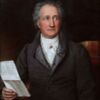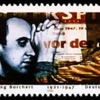Ulrich Plenzdorf (1934–2007)
Author of The New Sorrows of Young W
About the Author
Works by Ulrich Plenzdorf
Suhrkamp BasisBibliothek : Ulrich Plenzdorf : Die neuen Leiden des jungen W. (2004) — Text — 130 copies, 2 reviews
Die Legende von Paul & Paula | Die neuen Leiden des jungen W. : Ein Kino- und ein Bühnenstück (1977) — Author — 4 copies
Associated Works
The New Sufferings of Young W. and Other Stories from the German Democratic Republic (1997) — Contributor — 12 copies
Tagged
Common Knowledge
- Legal name
- Plenzdorf, Ulrich
- Birthdate
- 1934-10-26
- Date of death
- 2007-08-09
- Burial location
- Berlin, Germany
- Gender
- male
- Nationality
- Germany
- Birthplace
- Berlin, Germany
- Place of death
- Berlin, Germany
- Places of residence
- Berlin, Germany
- Occupations
- playwright
screenwriter - Organizations
- Akademie der Künste Berlin (seit 1992)
Literaturinstitut Leipzig (2004) - Awards and honors
- Adolf-Grimme-Preis (1995)
Ingeborg-Bachmann-Preis (1978)
Heinrich-Mann-Preis DDR (1973)
Members
Reviews
Lists
Awards
You May Also Like
Associated Authors
Statistics
- Works
- 32
- Also by
- 2
- Members
- 790
- Popularity
- #32,237
- Rating
- 3.4
- Reviews
- 9
- ISBNs
- 65
- Languages
- 8
















Seventeen-year old Edgar Wibeau is a “straight A” student and an upcoming model citizen of the GDR. Until one day he does the unthinkable – he drops out of his apprenticeship, escapes from his sleepy home town, and settles down at his friend Willi’s abandoned summer house in East Berlin. Over the next few months he finds a handyman job, falls in love with a happily-engaged kindergarten teacher named Charlie and develops an unlikely fixation with Goethe’s Sorrows of Young Werther. After Edgar dies in a cartoonish accident, his estranged father tries to piece together the final chapter of his son’s story by interviewing his friends and acquaintances. Transcripts of the interviews are found throughout the book (possibly an indication of the novel’s early life as a screenplay). They alternate with tragicomic “American Beauty” style monologues delivered by the dead Edgar himself.
The novel’s literary forebears are Salinger’s [b:The Catcher in the Rye|5107|The Catcher in the Rye|J.D. Salinger|https://images.gr-assets.com/books/1398034300s/5107.jpg|3036731] and Goethe’s [b:The Sorrows of Young Werther|16640|The Sorrows of Young Werther|Johann Wolfgang von Goethe|https://images.gr-assets.com/books/1386920896s/16640.jpg|746264]. Both are referenced in the book, with Goethe’s novel inspiring the title and playing a part in the plot. Indeed, The New Sorrows works best as a parody of Goethe, spiced with an element of political satire. The bucolic backdrop of the original Sorrows is replaced by a grey East Berlin, the OTT Romantic language substituted by Edgar’s “trendy” colloquialisms. It must have been particularly difficult to evoke the now dated 1970s German slang. In her 2015 translation for Pushkin Press, Romy Fursland opts for an argot which veers between the quaint and the cringe-inducing, but which is surprisingly effective.
This feels like a novel of its time – but nonetheless remains an enjoyable and often funny read.… (more)